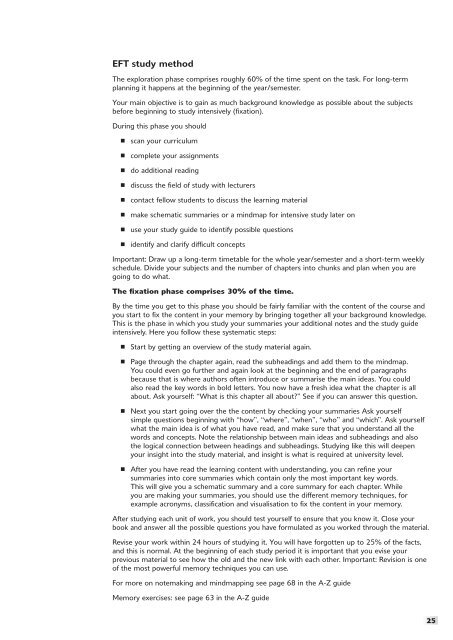my Studies @ Unisa - University of South Africa
my Studies @ Unisa - University of South Africa
my Studies @ Unisa - University of South Africa
You also want an ePaper? Increase the reach of your titles
YUMPU automatically turns print PDFs into web optimized ePapers that Google loves.
EFT study method<br />
The exploration phase comprises roughly 60% <strong>of</strong> the time spent on the task. For long-term<br />
planning it happens at the beginning <strong>of</strong> the year/semester.<br />
Your main objective is to gain as much background knowledge as possible about the subjects<br />
before beginning to study intensively (fixation).<br />
During this phase you should<br />
<br />
<br />
<br />
<br />
<br />
<br />
<br />
<br />
scan your curriculum<br />
complete your assignments<br />
do additional reading<br />
discuss the field <strong>of</strong> study with lecturers<br />
contact fellow students to discuss the learning material<br />
make schematic summaries or a mindmap for intensive study later on<br />
use your study guide to identify possible questions<br />
identify and clarify difficult concepts<br />
Important: Draw up a long-term timetable for the whole year/semester and a short-term weekly<br />
schedule. Divide your subjects and the number <strong>of</strong> chapters into chunks and plan when you are<br />
going to do what.<br />
The fixation phase comprises 30% <strong>of</strong> the time.<br />
By the time you get to this phase you should be fairly familiar with the content <strong>of</strong> the course and<br />
you start to fix the content in your memory by bringing together all your background knowledge.<br />
This is the phase in which you study your summaries your additional notes and the study guide<br />
intensively. Here you follow these systematic steps:<br />
<br />
<br />
<br />
<br />
Start by getting an overview <strong>of</strong> the study material again.<br />
Page through the chapter again, read the subheadings and add them to the mindmap.<br />
You could even go further and again look at the beginning and the end <strong>of</strong> paragraphs<br />
because that is where authors <strong>of</strong>ten introduce or summarise the main ideas. You could<br />
also read the key words in bold letters. You now have a fresh idea what the chapter is all<br />
about. Ask yourself: “What is this chapter all about?” See if you can answer this question.<br />
Next you start going over the the content by checking your summaries Ask yourself<br />
simple questions beginning with “how”, “where”, “when”, “who” and “which”. Ask yourself<br />
what the main idea is <strong>of</strong> what you have read, and make sure that you understand all the<br />
words and concepts. Note the relationship between main ideas and subheadings and also<br />
the logical connection between headings and subheadings. Studying like this will deepen<br />
your insight into the study material, and insight is what is required at university level.<br />
After you have read the learning content with understanding, you can refine your<br />
summaries into core summaries which contain only the most important key words.<br />
This will give you a schematic summary and a core summary for each chapter. While<br />
you are making your summaries, you should use the different memory techniques, for<br />
example acronyms, classification and visualisation to fix the content in your memory.<br />
After studying each unit <strong>of</strong> work, you should test yourself to ensure that you know it. Close your<br />
book and answer all the possible questions you have formulated as you worked through the material.<br />
Revise your work within 24 hours <strong>of</strong> studying it. You will have forgotten up to 25% <strong>of</strong> the facts,<br />
and this is normal. At the beginning <strong>of</strong> each study period it is important that you evise your<br />
previous material to see how the old and the new link with each other. Important: Revision is one<br />
<strong>of</strong> the most powerful memory techniques you can use.<br />
For more on notemaking and mindmapping see page 68 in the A-Z guide<br />
Memory exercises: see page 63 in the A-Z guide<br />
25

















